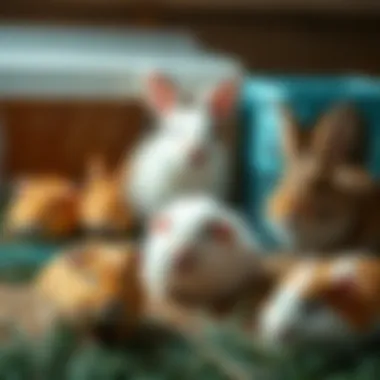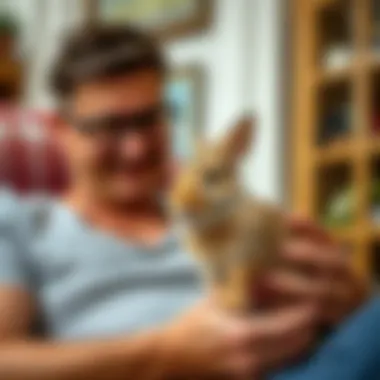Understanding and Caring for Small House Pets


Intro
In recent years, the charm of small house pets has gathered momentum, captivating the hearts of many. Their diminutive size and manageable care requirements make them ideal companions for busy urbanites and families alike. However, understanding what it truly means to welcome these little creatures into your home goes beyond just providing food and shelter. Each pet possesses unique characteristics, personalities, and care needs that, when met with attentiveness, can lead to profoundly fulfilling relationships between owner and pet.
Whether it's the gentle purring of a feline friend or the lively hops of a rabbit, small pets have a way of enriching our lives in extraordinary ways. But this journey of pet ownership necessitates knowledge—knowledge about each pet's needs, how to nurture them effectively, and the shared experiences that can enhance both their lives and ours. This guide will delve into the essentials of caring for small house pets, exploring various species, their nutritional needs, grooming habits, and the importance of behavioral training.
Equipped with this comprehensive understanding, current and prospective owners will find themselves well-prepared to make informed decisions, ensuring that their companions not only thrive but also contribute to a joyful household.
Prolusion to Small House Pets
Small house pets have become increasingly popular in recent years, capturing the hearts of many and changing the way we think about companion animals. As society evolves, our homes grow smaller, leading us to seek out pets that fit our living conditions while still offering companionship and joy. This article seeks to highlight the unique aspects of small house pets and the many benefits they have, making it a must-read for both existing and prospective pet owners.
Defining Small House Pets
Small house pets generally refer to small-sized animals that thrive in indoor environments. These include a variety of creatures such as rabbits, guinea pigs, hamsters, fish, and certain bird species. Each of these pets brings its own characteristics and needs that distinguish them from larger pet counterparts like dogs or cats. For example, a guinea pig, with its gentle demeanor and social nature, is quite different in care needs and interaction from, say, a parakeet, which may exhibit more independent behaviors.
In essence, small house pets are defined less by their size alone and more by their adaptability to indoor living. They provide emotional support and companionship, often fitting seamlessly into the lifestyles of busy urban dwellers or families with limited space.
Why Choose Small Pets?
When discussing the choice of small pets, the reasons are as varied as the pets themselves. Here are a few significant considerations:
- Space Efficiency: Small pets naturally require less physical space, making them ideal for apartment living or homes with limited square footage.
- Lower Maintenance: While they still need care and attention, many small animals typically demand less time than larger pets, from grooming to exercise.
- Affordability: The costs associated with small pets often are manageable compared to larger animals. Food, housing, and routine care can fall within budget for most households.
- Engagement without Commitment: Small pets often allow for a satisfying pet ownership experience without the long-term commitment that larger animals often entail.
"Owning a small pet may well be one of the most rewarding experiences for those wishing to bring an animal into their lives without overwhelming responsibility."
Popular Types of Small House Pets
Understanding the various species that fall into the small house pet category is vital. These adorable companions come with unique characteristics, care needs, and joys that can profoundly influence one's choice of pet. The popularity of small house pets speaks volumes; often, they are the perfect fit for apartment living or families who might find larger animals overwhelming. They tend to require less physical space and typically have simpler management needs.
Choosing the right type of small pet can enrich lives immensely. They serve as excellent companions, providing warmth and love while often being low-maintenance compared to larger animals. This section will dive into some popular small pets, including their behaviors, basic care requirements, and how they can become integral to your daily life.
Rabbits
Behavior and Temperament
Rabbits are known for their gentle and friendly nature. Their playful antics can brighten anyone's day, making them appealing companions in many households. Unlike some more aloof pets, bunnies can form strong bonds with their human families. A key characteristic is their sociability; they often thrive when they have a companion, whether it's another rabbit or a human. It’s beneficial for owners to consider adopting more than one if space allows.
A unique feature of rabbit behavior is their need for mental stimulation. They often enjoy exploring and can become bored quickly, which might lead to destructive behaviors. Hence, investing in toys and enriching their environment becomes essential.
Space Requirements
When it comes to space, rabbits are relatively easygoing but do need room to hop around. An active bunny may require a living space that allows for runs of three to four feet, similar to the size of a small dog crate. Providing a spacious area is pivotal for their well-being.
Forming a pen-like area is an effective choice, ensuring they can stretch their legs without too many boundaries. However, owners should be cautious with carpets and cables, as bunnies love to chew!
Basic Care
Basic care for a rabbit includes feed choices, habitat cleaning, and interaction. Regular grooming is necessary, especially for long-haired breeds. Additionally, monitoring health is vital, meaning regular vet visits should be on every owner’s checklist.
Most importantly, rabbit diet needs to be rich in hay, supplemented by veggies and occasional treats. This balanced nutrition ensures their happiness and longevity. To sum up, understanding these essentials can transform your experience as a responsible bunny parent.
Guinea Pigs
Nutritional Needs
Guinea pigs have specific dietary requirements that must be met to keep them healthy. They primarily need high-quality hay, enriched with fresh vegetables and specially formulated pellets. This prevents common issues like scurvy—Vitamin C deficiency, which these animals cannot produce themselves punctuates their nutritional needs.
Knowing what to feed them ensures longevity and vitality, making them a popular choice for new pet owners.
Socialization
These pets are incredibly social animals. In fact, they often do best in pairs or small groups, harmonizing well with one another. Most guinea pigs will even develop personalities, recognizing their owners and awaiting companionship. It’s beneficial for prospective owners to understand how to introduce new guinea pigs properly to minimize stress and foster cooperation between pets.


Unique to guinea pigs is their capacity to vocalize varied emotions, from contentment to fear. Understanding these sounds can significantly enhance bonding experiences.
Common Health Concerns
Just like any pet, guinea pigs are prone to certain health issues, including respiratory problems and dental diseases. It's crucial for owners to familiarize themselves with signs of distress, such as a lack of appetite or abnormal behavior. Regular vet visits help monitor their health and prevent illnesses from escalating. By being informed about these common concerns, one can play an active role in maintaining a pet's health.
Hamsters
Types of Hamsters
Hamsters are quite popular for their variety and generally easy-going nature. Common types include the Syrian hamster, known for its larger size and solitary habits, and dwarfs like the Roborovski and Campbell’s. Each has its own personality traits, which can contribute to the owner's choice based on their lifestyle.
The Syrian hamster, for instance, can be friendly and cuddly while needing solitary confinement. Whereas dwarf hamsters might be better for families enjoying the antics of multiple hamsters together. Picking the right type plays a significant role in a successful pet ownership experience.
Caging and Environment
Creating a proper habitat for hamsters is equally crucial. A well-ventilated cage with enough room for exercise wheels and tunnels is necessary. This helps to keep their inquisitive spirits at bay. They include hiding spaces that mimic their natural environment, allowing hamsters a comfortable place to retreat when they feel overwhelmed.
With the proper cage setup, owners can ensure their little critters remain active and healthy, encouraging natural behaviors.
Handling Tips
Proper handling of hamsters is essential for building trust. It’s best to handle them gently and offer them tasty treats during interactions. A key tip is to let them sniff your hand before lifting them, as it helps reduce stress. Although they are friendly, hamsters can be nippy when startled, so gradual introductions can yield positive results over time.
Fish
Choosing the Right Aquarium
Setting up an appropriate aquarium is crucial for keeping fish happy and healthy. Various sizes exist, but even small fish require a minimum of 5 gallons. This helps keep water parameters stable. Furthermore, incorporating plants, hiding spots, and decorations can create a stimulating environment for fish to thrive.
The unique feature here is that aquariums are not just homes for fish but also beautiful elements in living spaces. With proper planning, fish owners can create stunning displays that enhance the home.
Water Quality Management
Water quality is paramount in fish care. Regular testing to check ammonia, nitrite, and nitrate levels is essential for fish wellbeing. A water change routine can help maintain a healthy environment, which can lead to happier, livelier fish. This aspect is vital as poor water quality can lead to stress and health problems for the fish.
Developing a thorough understanding of these needs means that fish owners can effectively avoid common problems associated with new tanks.
Compatibility of Species
When selecting fish, ensuring compatibility amongst species is critical. Some fish are docile, while others might be aggressive. Owners should aim to create a peaceful community within their aquarium by choosing species that get along well, reducing stress for everyone involved. An in-depth research process before selecting fish can greatly influence the success of the aquarium.
Birds
Common Pet Bird Species
Among birds, parakeets and cockatiels rank high for pet ownership. Their engaging nature makes them preferable for families. Birds like these offer companionship and social interactions that many other small pets do not.
They often display personality traits that reflect intelligence, making them relatable and enjoyable pets. Enthusiasts appreciate how these creatures can mimic sounds and engage in social behaviors, which can captivate owners easily.
Behavioral Traits
Birds exhibit unique behaviors, like preening, vocalization, and engaging in playful antics. They often bond closely with their owners, recognizing routines and seeking attention. Understanding these behavioral traits is helpful in nurturing a strong bond between human and pet.
One must remember that birds thrive when given plenty of social interaction and mental stimulation. Their behavior patterns evolve with each interaction, emphasizing the human-animal connection.
Basic Training Techniques
Birds can be trained to follow commands or mimic verbal sounds. Basic training techniques can be rewarding for both bird and owner. Using rewards, like their favorite treats, can encourage learning, making routines more enjoyable. However, patience is key; training takes time and consistency.
Establishing connection through training can deepen the pet owner's experience while enhancing the well-being of their pet.
Care Essentials for Small Pets


Caring for small pets extends beyond merely providing food and shelter. It's about creating a nurturing environment that fosters their health and well-being. Understanding care essentials is crucial for any pet owner who wants to offer a happy and fulfilling life to their furry or scaly companions. Proper care encompasses basic needs such as nutrition, grooming, and ongoing health monitoring. Each element contributes uniquely to the overall quality of life for these pets, ensuring they thrive in a small home environment.
Feeding and Nutrition
Understanding Dietary Needs
One of the most pivotal aspects of caring for small pets is grasping their dietary needs. You'll find that not all animals require the same type of food, so you really want to pay attention to what’s suitable for your specific pet species. For instance, rabbits are herbivores and need a diet rich in hay, while hamsters thrive on a mix of grains and seeds. This specificity not only helps avoid health problems down the line but also ensures that your pet maintains a healthy weight and sufficient energy levels. Tailoring their diet to meet these needs can significantly improve their liveliness and may even increase their lifespan.
Commercial vs. Homemade Diets
When it comes to pet diets, there’s often a clash between commercial food options and homemade choices. Commercial diets are convenient and can offer a balanced nutrition when chosen carefully. However, some pet owners prefer to prepare homemade diets, aiming for fresher, potentially healthier ingredients. It’s worth noting that while homemade options can be nutritious, they may require more knowledge to ensure they meet all dietary requirements. Sometimes, you can end up inadvertently missing essential nutrients, which can lead to health issues in your pet. So, knowing what you're doing is key before making that switch.
Feeding Schedules
Setting a consistent feeding schedule is crucial not only for nutrition but also for establishing a routine. Animals like guinea pigs and rabbits benefit from regular feeding times, promoting good digestive health. This predictability helps them feel secure and can even keep them calmer, reducing anxiety. On the flip side, while flexible feeding times may suit some pets, a lack of schedule can lead to overeating or undernourishment. Understanding your pet's specific needs will guide you toward the most beneficial regime.
Grooming Requirements
Frequency of Grooming
Regular grooming is another vital aspect of small pet care, affecting their comfort and overall hygiene. Different pets require varying frequencies of grooming. For example, long-haired rabbits may require daily grooming to prevent matting, while a hamster may only need a light brushing every few days. Grooming not only keeps them clean but also serves as a bonding activity that can build trust between you and your pet. Neglecting this aspect may lead to skin irritations or even infection, so it is essential to stay on top of it.
Tools Needed
Equipping yourself with the proper tools can make grooming less of a chore and more of a pleasant experience. Depending on the type of pet, you might need brushes, clippers, or even specialized bathtubs. For instance, a grooming glove can be quite handy for cats, allowing for both brushing and petting at the same time. Having the right tools can streamline your efforts and keep your pet comfortable throughout the grooming process.
Grooming Techniques
Understanding effective grooming techniques is just as important as having the right tools. Each pet may react differently to grooming, so it helps to learn best practices for your specific animal. For example, when grooming a rabbit, a gentle, calm approach works best to keep them from getting skittish. On the flip side, hamsters may benefit from quick, efficient handling due to their smaller size and propensity to become scared. Learning these subtleties can make a world of difference in your grooming routine.
Health Care and Monitoring
Regular Check-Ups
Nothing beats the peace of mind that comes from regular veterinary check-ups to monitor your pet’s health. Depending on the species, some pets may require yearly visits, while others might need bi-annual evaluations. These check-ups help catch any early signs of illness that you might miss at home. Think of the vet as an essential partner in ensuring your pet's quality of life; better safe than sorry.
Vaccinations
Vaccinations are a cornerstone of preventive care that can help protect small pets from various diseases. Each species has different vaccination needs; for example, rabbits may require vaccines for viral hemorrhagic disease, whereas certain birds need vaccinations for polyoma virus. Keeping up with these inoculations not only safeguards your pet but reinforces responsible pet ownership.
Recognizing Signs of Illness
Being able to recognize signs of illness is crucial in ensuring your pet lives a long, healthy life. Changes in behavior, eating habits, or litter box usage can indicate underlying issues. If they seem unusually lethargic or don’t want to eat, these could be red flags. Being observant can enable you to act swiftly and potentially save their life by getting them prompt medical attention. An ounce of prevention is worth a pound of cure, after all.
Understanding these fundamental aspects of care is not only essential for the well-being of your small house pets but also enriches the bond you share with them.
The Psychological Benefits of Small Pets
Having small house pets can indeed change lives in more ways than one. While people often consider the logistical aspects—like feeding, care, and space—one cannot overlook the psychological advantages these tiny companions offer. This section elaborates on the emotional support and stress relief that small pets can provide for their owners, emphasizing their transformative impact on mental health.
Emotional Support
Small pets can be a source of profound emotional support. Many individuals find comfort in the presence of a furry or feathery friend. When someone comes home after a long, tough day at work, seeing a rabbit or a guinea pig excited to see them can uplift spirits. There's something inherently comforting about petting a soft coat or watching a hamster scurry about its enclosure.
- Unconditional Love: Small pets provide a non-judgmental presence. Their loyalty to their owners encourages a feeling of acceptance. This can be particularly valuable for those who may struggle with social interactions, as nurturing these animals can act as a bridge to developing deeper emotional connections elsewhere in life.
- Routine and Responsibility: Caring for a small pet instills a sense of purpose. Regular feeding and maintaining their environment create structure in a person’s day-to-day life. This routine can foster feelings of stability and calm, which are essential components of emotional well-being.
- Companionship: During lonely times, small pets offer a pal to hang out with. They fulfill a void that might otherwise remain, serving as a silent friend during introspective moments. Those living alone may find solace in the gentle sounds of a pet moving about, making a home feel less empty.
“A small pet can be a balm for the soul. Their need for care can remind us that we are valued in another’s eyes.”
Stress Relief
Managing stress in our fast-paced lives has become increasingly important, and small pets can be instrumental in this endeavor. The act of bonding with a small animal brings about several positive outcomes for mental health.
- Physical Interaction: Engaging with small pets offers a physical outlet. Whether it’s stroking a rabbit’s ears or holding a guinea pig, these small actions have a way of quieting the mind. Science has shown that pets can lower cortisol levels in the body, which is responsible for stress.
- Mindfulness and Present Living: Spending time with small pets encourages a shift towards mindfulness. When you focus on their needs and behaviors, it distracts from the stressors of daily life. Observing a pet can ground a person in the moment, helping to alleviate worries.
- Laughter and Joy: Watching pets can inject joy into an otherwise mundane day. The little quirks and antics of small animals can evoke laughter, which in turn is a natural stress-reliever. The simple act of witnessing a hamster nibble on a piece of carrot can bring about unexpected delight.


In a nutshell, the impact small pets have on psychological well-being is substantial. By offering emotional support and providing effective stress relief, these tiny companions contribute to a richer, more fulfilling life. Owning a small pet isn’t merely a hobby; it is an investment in one’s mental health and overall happiness.
For those pondering a new addition to the household, consider the psychological perks small pets provide. They might just be the companions you never knew you needed.
Best Practices for Small Pet Ownership
Owning small pets can be one of the most rewarding experiences. However, it requires a significant amount of attention and care. Knowing best practices allows pet owners not only to foster a loving environment but also to ensure their small companions lead a healthy and happy life. Whether you are a seasoned pet owner or a hopeful beginner, understanding these practices is essential.
Creating a Safe Environment
Pet-Proofing Your Home
Pet-proofing your home is a paramount element in ensuring the safety of your small pets. Small animals are often curious and adventurous, leading them to explore every nook and cranny. This inquisitiveness can put them in danger if potential hazards are nearby. By taking steps to fully pet-proof your living space, you reduce the risks of accidents and create a haven for your furry friends.
For instance, covering electrical cords with protective sheaths or duct tape can prevent unpleasant bites that may lead to shocks. Similarly, securing small objects that can be swallowed or chewed on is vital. It doesn't just avoid risks; it also relieves the owner of stress in monitoring them constantly in unsafe areas. You can also use baby gates to restrict access to certain areas, adding an extra layer of safety without limiting their exploration too much.
Choosing Suitable Spaces
Choosing suitable spaces for small pets is crucial in nurturing their health and happiness. Every pet has distinct space requirements, and recognizing these allows for better living conditions. For example, a rabbit needs ample room to hop, while hamsters thrive in confined areas that mimic their natural burrowing environments.
One key aspect here is ensuring that spaces are secure and free from drafts, which can be detrimental to small pets. Setting up their housing close to human activity but away from direct sunlight helps maintain a balanced environment. It's beneficial because it addresses both the physical and emotional needs of your pet. A cozy corner contributes to their well-being, providing a safe retreat. In contrast, a poorly chosen location can stress them out, leading to behavioral problems.
Fostering Bonding and Interaction
Engaging Activities
Fostering a connection with your small pet can greatly enhance their quality of life. Engaging activities, such as simple games or interactive toys, can stimulate your pet mentally and physically. For instance, guinea pigs enjoy foraging activities, which can be achieved by hiding treats around their habitat. Not only is this fun, but it also taps into their natural instincts.
What sets engaging activities apart is that they create opportunities for bonding. When pets play with their owners, the relationship deepens. Engaging your pets in play allows owners to observe causes and effects of their behaviors, improving the understanding between them. However, it’s important to note that not every pet may have the same stamina or playfulness, so tailoring the activities to their specific character traits is essential.
Understanding Body Language
Understanding body language is another vital component in building a strong relationship with your small pet. Just like humans, animals communicate their feelings and intentions through gestures and sounds. For example, a rabbit’s thumping can be a warning sign while a guinea pig’s purring may convey happiness. Observing these cues can guide owners in meeting their pets' needs effectively.
The unique feature of knowing body language is that it fosters empathy. When you interpret what your pet is trying to express, from fear to comfort, you become more attuned to their emotional state. This not only enhances your bond but also helps you become proactive in addressing any issues they may face.
Traveling with Small Pets
Preparation and Supplies
Preparation and supplies are key elements of a successful trip with your small pet. Much like packing for a human vacation, you must ensure you have everything needed for your pet's comfort and safety. This can involve choosing the right carrier, packing their favorite food, and including toys that can help ease travel stress.
A notable characteristic of good preparation is the anticipation of your pet's needs. For example, water dispensers that attach to carriers can be a lifesaver during long journeys, keeping your pet hydrated while minimizing spillage. Ensuring you have everything they require in advance reduces last-minute stress and makes traveling more enjoyable for both of you.
Safe Transport Practices
Safe transport practices play a significant role in the well-being of your small pet during travel. This involves securing them in appropriate carriers designed for their species. For instance, hamsters should be in well-ventilated cages while larger animals need enough movement space to feel comfortable.
What makes safe transport so important is that the risks of accidents are amplified on the road. Sudden stops can lead to injuries if pets are not securely contained. Taking time to understand safe transport practices reflects responsible ownership and underscores the commitment to prioritizing the safety of your small pets.
"The better the preparation, the smoother the journey. Your small pet deserves the same level of thought and care as a family member when hitting the road.”
Understanding these best practices for small pet ownership strengthens the bond with your companions and enriches their lives tremendously. Each element discussed here addresses unique needs, making sure your small pet thrives in every aspect of their existence.
Finale: The Value of Small Pets in Modern Life
In today’s fast-paced world, small house pets offer companionship that is both profound and soothing. They bring a sense of joy and purpose, often warming the hearts of their owners in ways that are hard to quantify. This article meticulously explored the various dimensions of small pets, from their diverse care requirements to their unique characteristics.
The considerations one must keep in mind regarding small pets encapsulate not just the responsibilities of ownership, but also the myriad benefits they provide. Emotional support is an intrinsic aspect of pet ownership; many individuals find solace in the companionship of a small furry or feathered friend. Moreover, these pets often contribute to reduced stress levels and improved mental well-being.
"A pet can be a source of joy like no other, effortlessly bringing a smile to your face on a gloomy day."
Not only do small pets encourage a routine—which is vital for both animal and owner—but they are also remarkably adaptable to various living environments. Their generally lower space requirements compared to larger animals make them ideal for urban dwellers. This adaptability presents multiple opportunities for interaction without the demanding requirements that a larger pet might entail.
Additionally, the bonding experience is unique with small pets. Fostering relationships through care routines, playtime, and training enhances both the emotional connection and the pet’s overall well-being. Engaging in these activities teaches responsibility and empathy, especially in children, laying the groundwork for nurturing relationships with all living things.
It’s crucial to keep in mind the commitment of properly caring for these animals. Prospective pet owners should do their due diligence, ensuring they select a pet that aligns with their lifestyle and living situation. Researching the specific needs of species like rabbits, guinea pigs, or birds fosters a sense of preparedness that is invaluable.
In summary, small house pets offer a worth that is tangible in daily life, providing companionship, emotional benefits, and teaching valuable life lessons. They are not merely animals but rather, holistic enrichers of our lives.
For those considering adding a small pet to their households, it's paramount to approach the journey with understanding and preparedness. Invest in learning about their care and needs. As is often said, a well-cared-for pet is a happy pet, and that rings true in fostering a fulfilling companion relationship that will last for many years to come.















